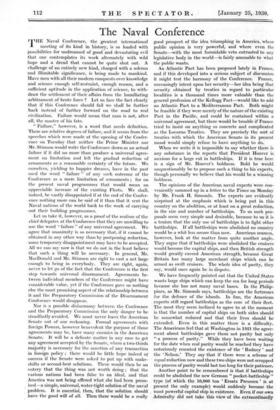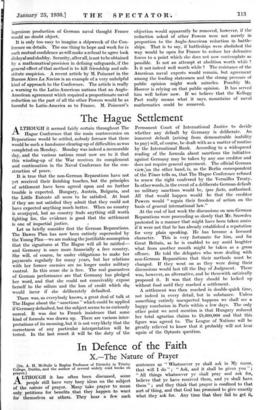The Naval Conference
THE Naval Conference, the greatest international meeting of its kind in history, is so loaded with possibilities for undreamed of good and devastating evil that one contemplates its work alternately with wild hope and a dread that cannot be quite shut out. A challenge of an entirely new kind, charged with a solemn and illimitable significance, is being made to mankind. Have men with all their modern conquests over knowledge and science enough self-restraint, enough reason, and a sufficient aptitude in the application of science, to with- draw the settlement of their affairs from the humiliating arbitrament of brute force ? Let us face the fact clearly that if this Conference should fail we shall be further back instead of further forward on the road to real civilization. Failure would mean that man is not, after all, the master of his fate.
" Failure," however, is a word that needs definition. There are relative degrees of failure, and it seems from the speeches which were made at the opening of the Confer- ence on Tuesday that neither the Prime Minister nor • Mr. Stimson would write the Conference down as an actual failure if it did no more than produce a universal agree- ment on limitation and left the gradual reduction of armaments as a reasonable certainty of the future. We ourselves, yielding to happier dreams, have in the past used the word " failure " of any such outcome of the Conference as a mere limitation of armaments ; for on the present naval programmes that would mean an appreciable increase of the existing Fleets. We shall, indeed, be vastly disappointed if at the end of the Confer- • ence nothing more can be said of it than that it sent the Naval nations of the world back to the work of carrying • out their building programmes.
Let us take it, however, as a proof of the realism of the chief delegates at the Conference that they are unwilling to • use the word " failure" of any universal agreement. We , agree that unanimity is so necessary that, if it cannot be obtained in any other way than by postponing reduction, some temporary disappointment may have to be accepted. All we can say now is that we do not in the least believe that such a thing will be necessary. In general, Mr. MacDonald and Mr. Stimson are right to cast a net large enough to bring in everybody. They are right, again, never to let go of the fact that the Conference is the first step towards universal disarmament. Agreements be- tween individual members of the Conference might have considerable value, yet if the Conference gave us nothing else the most promising aspect of the relationship between it and the Preparatory Commission of the Disarmament Conference would disappear.
Nor is a possible disharmony between the Conference and the Preparatory Commission the only danger to be steadfastly avoided. We must never leave the American Senate out of our reckoning. Formal agreements with foreign Powers, however benevolent the purpose of those agreements may be, have many enemies in the American Senate. It will be a delicate matter in any case to get any agreement accepted by the Senate, where a two-thirds majority is necessary for the sanction of any transaction in foreign policy ; there would be little hope indeed of success if the Senate were asked to put up with make- shifts or second-best solutions. There would then be an outcry that the thing -was not worth doing ; that the various nations had been false to an ideal, and that America was not being offered what she had been prom- , ised—a simple, universal, water-tight solution of the naval problem. It is essential, then, that the solution should have the good will of all. Then there would be a really good prospect of the idea triumphing in America, where public opinion is very powerful, and where even the Senate—with the most formidable veto entrusted to any legislative body in the world—is fairly amenable to what the public wants.
An Atlantic Pact has been proposed lately in France, and if this developed into a serious subject of discussion it might test the harmony of the Conference. France, unceasingly intent upon her security—her idea being that security obtained by treaties in regard to particular localities is a thousand times more valuable than the general profession of the Kellogg Pact—would like to add an Atlantic Pact to a Mediterranean Pact. Both might be feasible if they were merely of the nature of the existing Pact in the Pacific, and could be contained within a universal agreement, but there would be trouble if France tried to insist on anything so concrete and complicated as the Locarno Treaties. They are precisely the sort of treaties with which the American Senate in its present mood would simply refuse to have anything to do. When we write it is impossible to say whether there is any substance in the reports that President Hoover is anxious for a large cut in battleships. If it is true here is a sign of Mr. Hoover's boldness. Bold he would unquestionably be to propose such a thing to his•experts, though personally we believe that his would be a winning boldness.
The opinions of the American naval experts were con- veniently summed up in a letter to the Times on Monday by Mr. Frank H. Simonds. The experts are evidently surprised at the emphasis which is being put in this country on the abolition, or at least on a great reduction, in the size and number of battleships. To us such pro- posals seem very simple and desirable, because to us it is a truism that the only use of battleships is to fight other battleships. If all battleships were abolished no country would be a whit less secure than now. American seamen, however, look at the matter from quite another angle.
They argue that if battleships were abolished the cruisers would become the capital ships, and then British strength would greatly exceed American strength, because Great Britain has many large merchant ships which can be armed as swift cruisers. The whole idea of parity, they say, would once again be in dispute.
We have frequently pointed out that the United States wants large ships which can keep the sea for long periods because she has not many naval bases. In the Philip- pines, as Mr. Simonds says, battleships are the fortresses for the defence of the islands. In fine, the American experts still regard battleships as the core of their fleet.
The most they seem inclined to agree to at the moment is that the number of capital ships on both sides should be somewhat reduced and that their lives should be extended. Even in this matter there is a difficulty. The Americans feel that at Washington in 1921 the agree- ment about battleships gave them • not parity but only " a process of parity." While they have been waiting for the date when real parity would be reached they have notoriously resented the existence of the ` Rodney ' and the `Nelson.' They say that if there were a scheme of equal reduction now and these two ships were not scrapped the process of parity would last too long for their patience.
Another point to be remembered is that if battleships could be abolished the new German " pocket-battleship•" type (of which the 10,000 ton ` Ersatz Preussen' is at present the only example) would suddenly become the most powerful capital ship in existence. Even if our own Admiralty did not take this view of the extraordinarily ingenious production of German naval thought France would no doubt object.
It is only too easy to imagine a shipwreck of the Con- ference on details. The one thing to hope and work for is such mutual confidence as will make a refusal to agree look disloyal and shabby. Security, after all, is not to be obtained by a mathematical precision in defining safeguards, if the general effect of that method is to kill friendship and sub- stitute suspicion. • A recent article by M. Poineare in the Buenos Aires La Nacion is an example of a very unhelpful kind of approach to the Conference. The article is really a warning to the Latin-American nations that an Anglo- American agreement which required a proportionate naval reduction on the part of all the other Powers would be as harmful to Latin-America as to France. M. Poineare's objection would apparently be removed, however, if the reduction asked of other Powers were not merely in proportion to the Anglo-American reduction in battle- ships. That is to say, if battleships were abolished the way would be open for France to reduce her defensive forces to a point which she does not now contemplate as possible. Is not an attempt at abolition worth while ? Is it not indeed well worth while ? The resistance of the American naval experts would remain, but agreement among the leading statesmen and the strong pressure of public opinion might work miracles. Possibly Mr. Hoover is relying on that public opinion. It has served him well before now. If we believe that the Kellogg Pact really means what it says, mountains of naval mathematics could be removed.







































 Previous page
Previous page